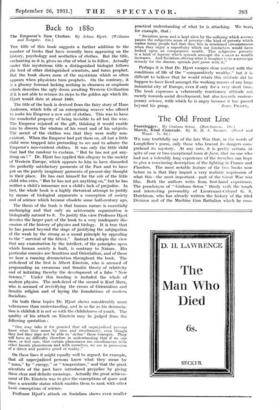Back to 188o
THE title of this book suggests a further addition to the number of books that have recently been appearing on the
history, psychology and aesthetics of clothes. But the title, enchanting as it is, gives no clue of what is to follow. Actually under this mysterious title a distinguished biologist follows the lead of other distinguished scientists, and turns prophet. But the book shows none of the mysticism which so often appears when physicists turn prophets. On the contrary, it is a gloomy forecast lacking nothing in clearness or emphasis which describes the ugly doom awaiting Western Civilization if it is not able to retrace its steps to the golden age which Dr. Hjort would date at about 1880.
The title of the book is derived from the fairy story of Hans Andersen, which tells of an enterprizing weaver who offered to make his Emperor a new suit of clothes. This was to have the wonderful property of being invisible to all but the wise. The Emperor rejoiced at the gift, thinking it would enable him to discern the wisdom of his court and of his subjects. The secret of the clothes was that they were really non- existent. When the Emperor had put them on, all but a little child were trapped into pretending to see and to admire the Emperor's non-existent clothes. It was only the little child that had the candour to exclaim, " But he has not got any- thing on ! " Dr. Hjort has applied this allegory to the society of Western Europe, which appears to him to have discarded the perfectly satisfactory garments of the Past and to have put on the purely imaginary garments of present-day thought in their place. He has cast himself for the role of the little child who cries, "But he has not got anything on," but he has neither a child's innocence nor a child's lack of prejudice. In fact, the whole book is a highly rhetorical attempt to justify by means of biological arguments a conception of society and of science which became obsolete some half-century ago.
The thesis of the book is that human nature is essentially unchanging and that only an aristocratic organization is biologically natural to it. To justify this view Professor Hjort devotes the larger part of the book to a very inadequate dis- cussion of the history of physics and biology. It is true that he has passed beyond the stage of justifying the subjugation of the weak by the strong as a moral principle by appealing to the " survival of the fittest." Instead he adopts the view that any examination by the intellect, of the principles upon which human society is built, is contrary to Nature. His particular enemies are Semitism and Orientalism, and of these we hear a running denunciation throughout the book. The arch-fiend of the first is Albert Einstein, who is accused of propounding an erroneous and Semitic theory of relativity and of initiating thereby the development of a false " New Science." Under this heading is included the whole of modern physics. The arch-fiend of the second is Karl Marx, who is accused of revivifying the errors of Orientalism and Semitic religion and of laying the foundations of modem Socialism.
On both these topics Dr. Hjort shows considerably more vehemence than understanding, and in so far as his denuncia- tion is childish it is not so with the childishness of youth. The quality of his attack on Einstein may be judged from the following quotation :
" One may take it for granted that all unprejudiced persons know what they mean by time and simultaneity, even though they feel they may not be able to ' define ' these concepts. They will have no difficulty therefore in understanding that if we can show, or feel sure, that certain phenomena are simultaneous with other known phenomena and with ourselves, we are in possession of a direct and positive proof of reality."
On these lines it might equally well be argued, for example, that all unprejudiced persons know what they mean by " mass," by " energy," or " temperature," and that the great scientists of the past have introduced prejudice by giving these clear and definite meanings. Actually the great achieve- ment of Dr. Einstein was to give the conceptions of space and time a scientific status which enables them to rank with other basic conceptions of science.
Professor Hjort's attack on Socialism shows even smaller practical understanding of what he is attacking. We hear, for example, that :
" Socialism arose and is kept alive by the suffering which accom- panies the subjective sense of poverty—the kind of poverty which makes many people feel that they live in straitened circumstances when they enjoy a superfluity which our forefathers would have looked upon as comparative wealth. This subjective poverty is a kind of leprosy which spreads amongst the n as ;es as wealth increases. And Socialism offering what it imagines to be a sovereign remedy for the disease, spreads pari passu with it."
Perhaps it is that Dr. Hjort escapes close contact with the conditions of life of the " comparatively wealthy." but it is difficult to believe that he would retain this attitude did he happen to have lived amongst the working masses of any large industrial city of Europe, even if only for a very short time. The book expresses a vehemently reactionary attitude not merely towards social development, but also towards contem- porary science, with which he is angry because it has passed


































 Previous page
Previous page